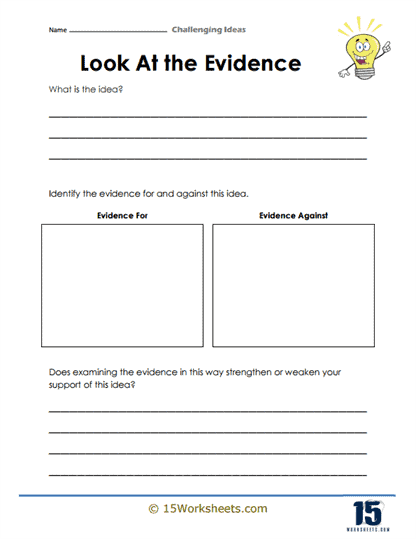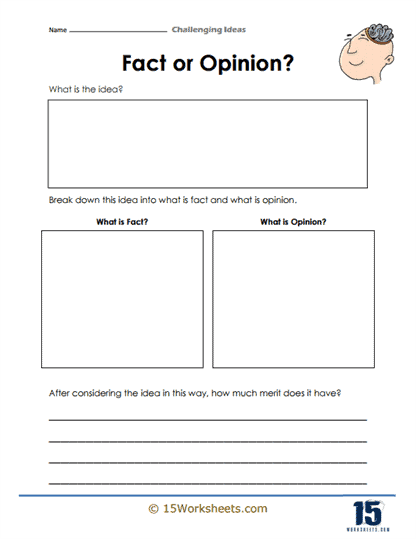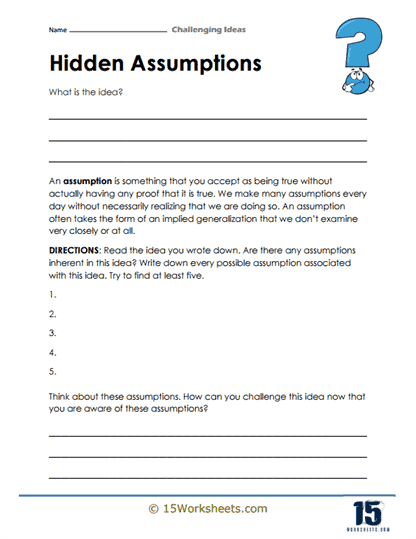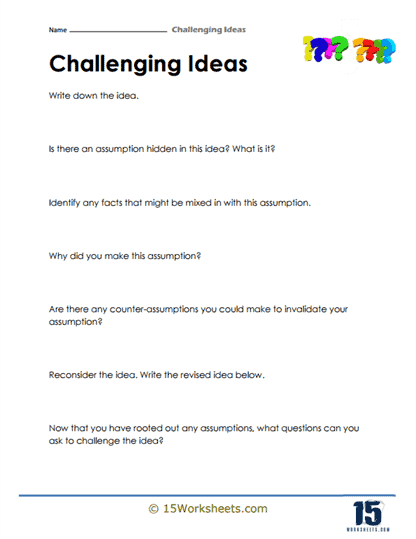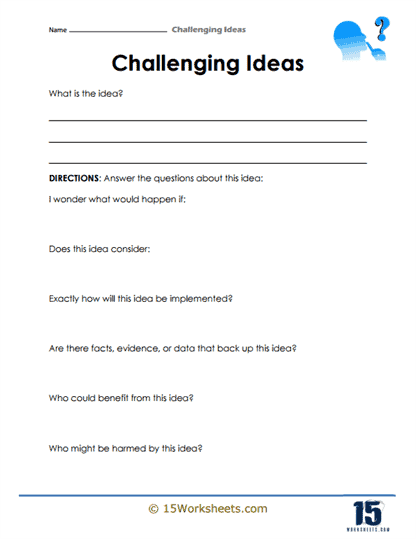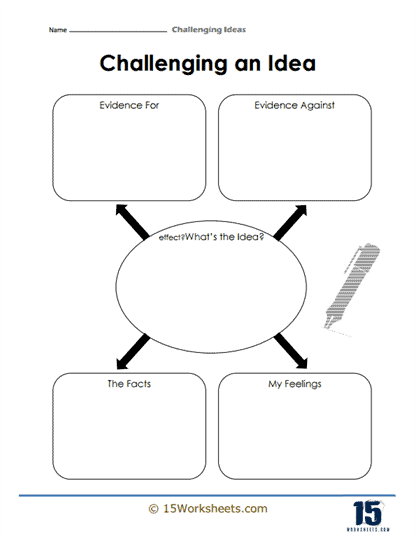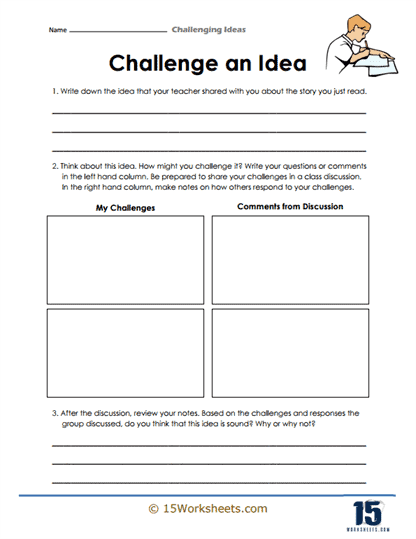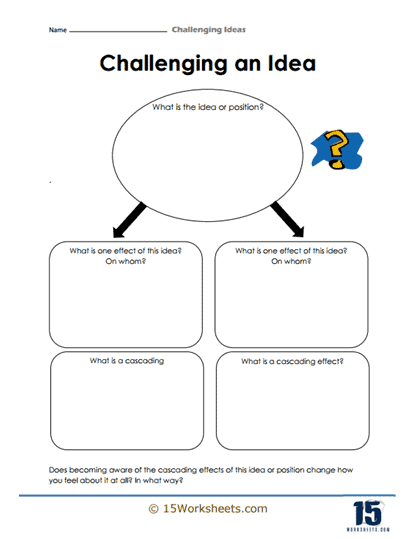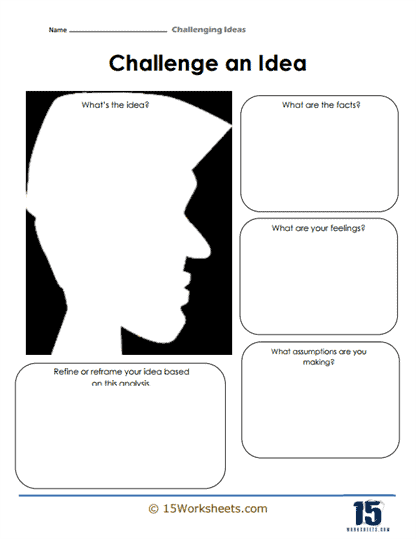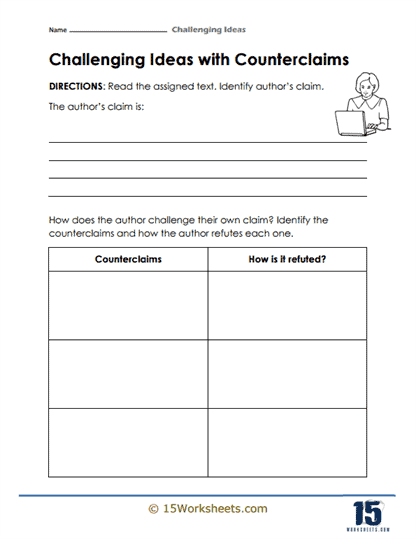Challenging Ideas Worksheets
All About These 15 Worksheets
These Challenging Ideas worksheets are designed to help students develop critical thinking skills by teaching them to analyze and evaluate complex ideas and arguments. These worksheets focus on concepts such as assumption, evidence, fact vs. opinion, claims and counterclaims, and more.
By completing these worksheets, students learn to question assumptions, identify biases, and evaluate the strength of arguments. They also learn to distinguish between fact and opinion, and to use evidence to support their own claims and arguments. With a variety of activities that encourage students to think critically about the information they encounter in their daily lives, they learn to develop their own opinions and perspectives based on evidence and logical reasoning. Through these worksheets, students will:
- Identify hidden assumptions;
- Learn how to examine evidence to determine which of them support or weaken their idea;
- Distinguish fact from opinion and understand how this strengthens their ideas or claims;
- Practice diligent fact-checking to formulate sound and strong ideas;
- Improve critical thinking skills to distinguish beneficial ideas from harmful ones;
- Develop an out-of-the-box way of thinking by learning to challenge even their own ideas;
- And be familiar with logical fallacies.
By learning how to challenge ideas, students become more confident and independent thinkers, better able to evaluate information and make informed decisions. This is a valuable skill that can be applied in many different areas of life, from academic research to personal relationships and beyond.
How to Challenge the Ideas of Others
When you challenge the ideas of others, you are only setting yourself up for more innovative solutions. However, it can be confusing- when someone tells you to feel free to challenge their ideas, should you only offer them opinions that are entirely contradictory to theirs?
Challenging the ideas of others can seem daunting. Even though you want to make your point most respectfully, you mustn’t come across as argumentative or stubborn.
Here are some effective ways you can use to counterpoint or offer a different set of opinions.
Don’t Be Afraid to Show Your Curiosity
Many people believe that if they are too curious, they will end up looking desperate and embarrassing. However, there is nothing further than the truth. Curiosity is never bad. In fact, when you want to challenge someone’s idea, it can be quite useful.
Start by acknowledging the person’s idea as an option and then ask them what would happen in an alternate scenario. Of course, you do not want to push so much that you make them defensive. Ask the question in a way that encourages the other person to view your point and devise a solution together so that everyone can keep their emotions in check.
Hint at an Alternate Route
No one likes to be challenged. However, one way to help them see your point is by bringing them papers and dates from reputable sources that prove a different path might be more beneficial. Discuss your idea further if you find that the person you are challenging is open to a conversation.
Be prepared with all the information you can get, along with a slide show if you are in a business setting. Always remember to mention how your idea can positively affect whatever the problem at hand is.
Ask Powerful Questions
Many people shy away from asking questions because they do not want to be embarrassed. However, challenging someone by asking questions is a respectful way to open their eyes to deeper insight.
By asking questions, you can reveal a flaw in their reasoning process or help them see possibilities that had previously not been discovered. Not only will you be regarded as an ally, but people will not view you as an enemy, making it a win-win situation for all.
Use Gentle Language
You must keep your tone and language in check. This means that even though you are free to challenge the ideas of others, you cannot be negative or mean to them.
Instead of saying “this idea is ridiculous” or “there is no way this will work,” use inclusive language. Ask things like “can I offer you an alternate idea?” or “this might not work, but what do you think about X?” Before you challenge someone, make sure that you have a counter idea that you can offer to them. Do not burn down someone else’s ideas to make them feel worthless, especially if you do not have a better solution.
Show that You Are On the Same Side
When you challenge the ideas of others, you need to make them see that you are trying to reach a mutually beneficial outcome.
This means coming up with behavioral hacks that will convey your message properly; for example, make eye contact, say “I” more than “you” so that it does not look like you are playing the blame game, and show them that you have been listening to them attentively.


